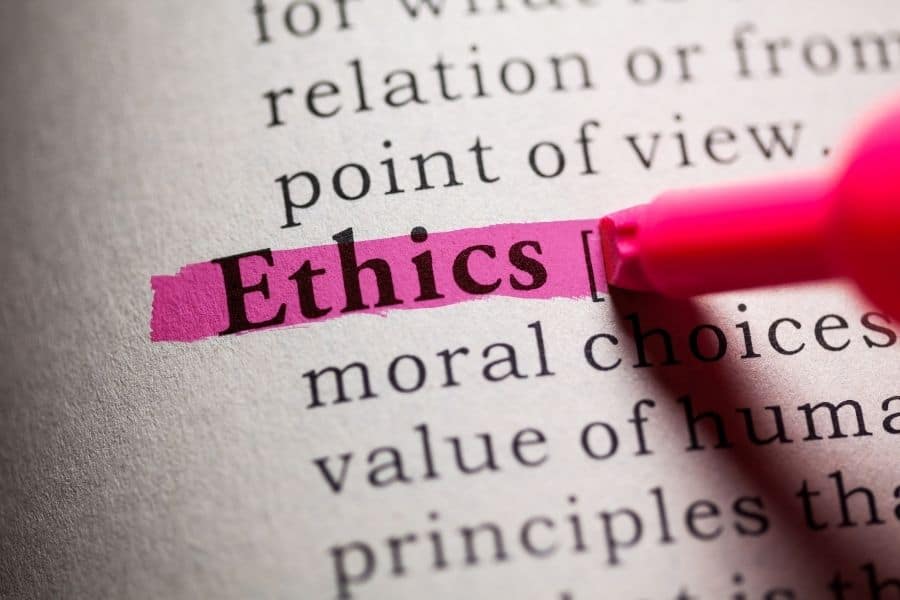Ethics & Laws – Introduction to Ethics
Introduction to Ethics
Understanding the Ethics Section of the MBLEx
The Ethics, Boundaries, Laws, and Regulations section of the MBLEx assesses a massage therapist’s understanding of professional responsibilities and ethical conduct. This section follows the official MBLEx Content Outline and covers:
- Ethical behavior and principles – Core values that guide professional conduct
- Laws and regulations related to massage and bodywork – Legal requirements and industry standards
- Scope of practice – Defining what a massage therapist can and cannot do
- Code of ethics violations – Recognizing and avoiding professional misconduct
- Therapeutic relationships, professional boundaries, and dual relationships – Maintaining a professional dynamic with clients
- Professional communication and confidentiality – Ethical interactions and client privacy
Since this content area accounts for 16% of the MBLEx, having a strong understanding of these topics is essential for both passing the exam and practicing ethically in the field. The MBLEx Prep Course will provide clear explanations of key concepts and practical applications to help you confidently apply ethical principles in real-world situations.


The Ethical Massage Therapist
Massage therapists must consistently uphold ethical standards in their practice. Ethical behavior protects the well-being of clients, maintains professional integrity, and fosters trust. Key ethical responsibilities include:
- Always acting in the client’s best interest
Prioritize the client’s health and safety. Use appropriate techniques, avoid harm, and refer clients to other professionals when needed. - Staying within your scope of practice
Perform only the services legally allowed for massage therapists. Do not diagnose conditions, prescribe treatments, or give medical advice. - Only performing techniques you are competent in
Use only techniques for which you have been trained. Continuing education ensures skills remain up to date and effective. - Practicing within the limits of the client’s informed consent
Ensure clients understand the purpose, benefits, and risks of treatment. Obtain ongoing consent and respect their preferences. - Setting realistic expectations for treatment outcomes
Be honest about what massage can and cannot achieve. Explain that results vary and that some conditions require multiple sessions or medical care. - Educating clients on the limitations of massage therapy
Clarify that massage is complementary to medical care, not a replacement. Encourage clients to seek medical attention when necessary.
Each of these principles ensures ethical, professional, and effective client care. This course will explore them in greater depth to prepare you for real-world practice and the MBLEx ethics section.
Key Terminology and Definitions
Ethics
Ethics refers to the moral principles and rules that guide behavior, ensuring individuals act in a way that is fair, just, and responsible. Ethics helps distinguish right from wrong in various situations and serves as the foundation for professional conduct.
Ethical guidelines are often adapted to fit different fields based on their unique challenges and responsibilities. Some examples include:
- Medical Ethics – Includes principles such as patient autonomy, beneficence (acting in the patient’s best interest), nonmaleficence (avoiding harm), and justice (fair treatment for all patients).
- Social Ethics – Governs moral behavior in society, addressing issues like fairness, equality, and human rights.
- Business Ethics – Focuses on honesty, integrity, and responsible decision-making in professional and corporate settings.
- Massage Therapy Ethics – Emphasizes client safety, confidentiality, professionalism, and staying within one’s scope of practice.
In massage therapy, ethical behavior ensures that therapists act in the best interests of their clients, maintain boundaries, and uphold professional integrity.
Principles
Principles are foundational rules, values, or standards that guide decision-making and behavior in both personal and professional settings. Ethical principles serve as a framework for professional conduct in massage therapy and other healthcare professions.
Key ethical principles relevant to massage therapy include:
- Honesty – Being truthful in all professional interactions, including setting realistic client expectations and providing accurate information about treatments.
- Respect – Recognizing the dignity, autonomy, and rights of clients and colleagues. This includes respecting client preferences, boundaries, and cultural differences.
- Accountability – Taking responsibility for one’s actions, decisions, and professional competence. This means acknowledging mistakes, seeking continued education, and staying updated on industry regulations.
- Confidentiality – Protecting client information and only sharing details when legally required or with the client’s informed consent.
- Informed Consent – Ensuring clients fully understand the nature, benefits, and potential risks of treatment before proceeding.
- Professionalism – Maintaining appropriate boundaries, dressing appropriately, and conducting oneself in a way that upholds the credibility of the profession.
Each of these principles plays a critical role in maintaining trust between therapists and clients, ensuring ethical and professional care in massage therapy.
Throughout this course, we will explore these topics in greater depth. You’ll gain a deeper understanding of informed consent, confidentiality, professional boundaries, and other ethical responsibilities, so you can confidently apply these principles in your practice and be ready for ethics questions on the MBLEx.

